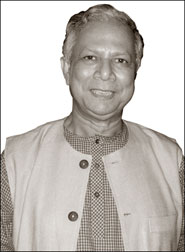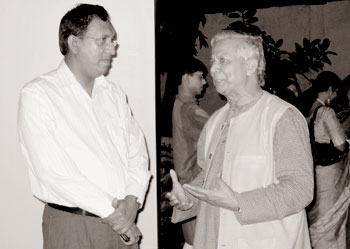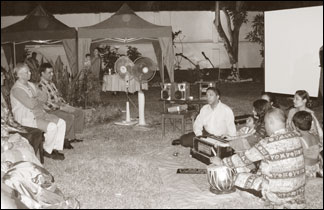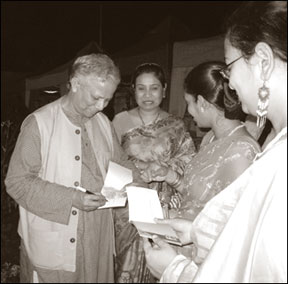Legend of largesse, yet unassuming
by Rosanne Koelmeyer Anderson
|

Prof Muhammad Yunus, Nobel Laureate 2006 |
A vibrant persona, clad in typical Bangladeshi Grameen checked fothua,
bubbling with energy, was a legend of economics and developer of the
concept of micro-credit, founder of the Grameen Bank and cynosure of all
eyes, Prof Muhammad Yunus, Nobel Laureate 2006, whom I had the pleasure
of interviewing last Saturday at a distinguished reception held at the
Bangladeshi High Commission at Gregory's Road Colombo 7.
Colombo came alive on August 21 when the legend addressed the Sixth
South Asian Free Media Conference which was well attended by the
country's most distinguished personalities with electronic media
epitomizing the icon's arrival to Sri Lanka by frequently inserting
excerpts of his speech, keeping the public well informed.
The vibrant personality was honoured for his great contribution; the
concept of micro-credit which gives would be entrepreneurs much needed
financing who are too poor to qualify for traditional bank loans.
The concept of micro-credit is to give out very small sums to very
poor people to start up their own enterprise, which has paved the way
for upliftment of millions of poor Bangladeshis, many of them women,
without any financial security by a legend, a leader whose success to
translate visions into practical action has benefited millions of people
,not only in Bangaladesh but also in many other countries.
|

Prof Yunus in a conversation with Media Minister Anura
Priyadharshana Yapa at the Bangaladesh High Commission

Bengali music and entertainment |
It has today become a reality, a role model and a success story of
poverty elevation. Prof. Mohammad Yunus was born to a well-to-do family
in Chittagong, a business center in Bangladesh, in 1940. His father was
a successful goldsmith who always encouraged his sons to seek higher
education. But his biggest influence was his mother, Sofia Khatun, who
always helped any poor person who knocked at their door.
This inspired Prof Yunus to commit himself towards eradication of
poverty and inculcate in him far-sighted thoughts which took him to
greater heights to where he stands today, indomitable, with universal
recognition.
The sprightly figure in his interview, full of zeal, vehemently
stressed that poverty is something that should not be there. It is
artificial, it is a denial by a system that creates poverty.
This has to be fixed up; which necessarily means going back to grass
root level, to society itself. Nobody should remain poor. Breaking these
walls is the crux of the matter of any system and the country should be
geared to do it, he went on to explain.
His vision is to reduce world poverty by half by 2015 and zero it by
2030 he quipped smiling; triumph and achievement towards his endeavour
to make his dream concept a reality. Prof. Yunus is a contended man.
Unassumingly candid in his perceptions he reiterated that he would be
glad to extend his services and advise to anyone who sought it for the
betterment of a society at large. What matters after all is that
people's lives are uplifted as much as possible, devoid of poverty.
Achieving fame and receiving Nobel Laureate 2006 is no surprise.
After all, Yunus was an outstanding student who won a Fullbright
Fellowship to do PhD at Vanderbilt University in Nashville, Tennessee in
1965 and thereafter returned home in 1972 to become the Head of the
Economics Department at the Chittagong University where he found the
situation in newly independent Bangladesh worsening day by day.
It was the terrible famine of 1974 in Bangladesh that changed his
life forever. He despised the thought that while people were dying of
hunger on the streets, he was teaching elegant theories of economics.
He felt the inadequacies of elegant theories of economics and finally
decided to make the poor his teachers and embarked on studying them and
questioning them about their lives. One fine day, interviewing a woman
who made bamboo stools, he learnt that, because she had no capital of
her own, she had to give more than 93% of her proceeds to the middleman.
Prof. Yunus identified the problem as one of structure ,lack of
credit to the poor which attributed to the thought that people are poor
today because of the failure of the financial institutions to support
them in the past. Thus, the idea of micro-credit was born by this
revolutionary who was bent on uplifting the economic and social status
of the poorest of the poor,and thus began his journey of commitment to
eradicate poverty and establish a better tomorrow .
The Grameen Bank (in Bengali, Grameen means rural) which Prof. Yunus
has built over the last 22 years, is today the largest rural bank in
Bangladesh. It has over 2 million borrowers and works in 35000 villages
in a country of 68000 villages. 94 % of its borrowers are women.
The bank is based on simple, sensible rules, meticulous organization,
imagination and peer pressure among borrowers. The break that Grameen
Bank offers is a collateral-free loan, sometimes equivalent to just a
few U.S. dollars and rarely more than $100.
In rural areas, it makes things happen. 98% of its loans are honoured.
Thus he has turned into reality a philosophy that the poorest of the
poor are the most deserving in the land and that given the opportunity
they can lift themselves out of the mire of poverty. His ideas combine
capitalism with social responsibility.
|

Prof Yunus signing autographs |
Micro-credit concept is now being practised in 58 countries. In the
US, it is a success even with the shifting poor of Chicago's toughest
districts. The United States alone has over 500 Grameen spin-offs.
Bill Clinton said in his election campaign that Yunus deserved a
Nobel Peace Prize and cited the experiment of Prof. Yunus as a model for
rebuilding the inner cities of America. Pilot projects have also begun
in Britain. The methods are adopted to suit local conditions, but the
principle of empowering individuals with their own capital is the same.
Prof Yunus and Grameen Bank were subsequently chosen in 2006 for the
prestigious award from among 191 candidates, including 168 individuals
and 23 organisations. Prof Yunus is the first Bangladeshi and also the
third Bengali after poet Rabindranath Tagore and economist Amartya Sen
to win the Nobel Prize.
"Good luck in all your future endeavours Prof. Yunus", I wished him
as I walked out of the High Commission as the Bengali music and singing
faded away into the night .
[email protected]
|
